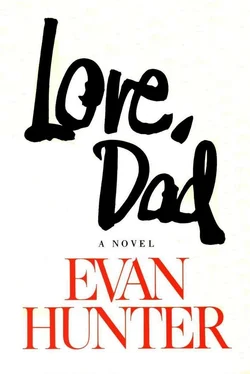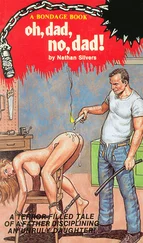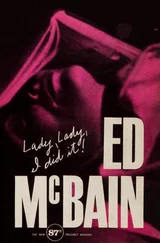And still, they did not speak.
With surprising alacrity, they began again at once, more familiarly this time. His fingers parted and probed, his hands roamed over her belly and her thighs, caressed her minuscule breasts with their all-consuming nipples, her backside, searched out her anal cavity (she had never permitted Judd to do this), again returned to her persistently moist and stubbornly aching vagina, labored her clitoris more forcefully now, abandoned it to reach for her face in the darkness, touching her nose and her lips like a blind man seeking, cupping her cheeks and her chin in both hands, his mouth claiming hers again. Her own hands moved lingeringly over the smooth almost hairless skin on his chest, the flat belly (her finger poking gently into his navel) then down to where his pubic hair began silkenly above his groin and then savagely transformed itself into the coarser red hair that surrounded his tumescent penis, smooth in the circle of her gliding fist, enlarging as she stroked it gently and lowered her mouth to it, insinuating the tip of her tongue into its single blind eye, moistening the engorged shaft and taking it pulsing between her lips.
When he entered her for the first time, she was astonished to find herself coming again at once, gasping in surprise as much as in passion, hearing herself muttering (never before with Judd), “Yes, fuck me, do it,” her nails digging into his backside, her trembling legs widespread, the ankles locked somewhere around the small of his muscular back as he pounded at her with a steady, controlled rhythm that brought her to orgasm twice again before at last he shuddered in her embrace and with a fierce final thrust spent himself inside her.
Now they talked — or at least he did.
As the first gray light of day broke timidly against the drawn shade on the single window in the room, as the sounds of morning traffic began on the street outside, peculiarly foreign in tone, the horns high and piping as compared to the deeper throated basses of American automobiles, they lay side by side, fingers entwined like those of children idly watching drifting clouds above a sloping summer hillside — and he talked.
Paul was almost nineteen, six months older than Lissie, a New Yorker born and bred who, upon his graduation from high school in June of 1969, had taken a job working as a common laborer for a construction company named Jenkins Contracting, Inc., run by a besotted old Irishman who’d taken to calling him “Gillie” for Gillis, a nickname he’d despised almost as much as he’d hated hauling bricks. He’d never planned on going to college — in high school he’d maintained a risky C-average that sometimes dipped into a C-minus and on occasion a D — and whereas he’d debated joining the Peace Corps, he’d somehow procrastinated, enjoying the lucrative bread he was earning and reasoning that his minor knee injury, a torn cartilage suffered while playing football for Cardinal Hayes High, would keep him forever safe from the draft.
The joke in 1969, however, prevalent among young men all over the United States, was that the Army was drafting even blind men, so long as their seeing-eye dogs could read the chart on the wall. Paul remained blithely unaware until the first of December, when the Selective Service System held its lottery for men who would be drafted in 1970. The newspapers the next day all published charts listing numbers and dates under headlines such as YOUR DRAFT CHANCES or YOUR DRAFT PROSPECTS. The newspapers all agreed that any man whose lottery number, premised on his date of birth, fell between 1 and 120 could be fairly certain he would be drafted in 1970. Men with numbers between 121 and 240 had a fifty-fifty chance of being drafted. Men with numbers higher than that could consider themselves reasonably safe. Paul’s birthday was June 10, 1951. His lottery number was 206. He weighed his fifty-fifty chances against the torn cartilage, and began reading the newspapers with an interest bordering on obsession, studying the daily body counts of North Vietnamese soldiers, and wondering what the count on American soldiers looked like in the Hanoi papers.
He was certain he would be killed in Vietnam.
Born into a Catholic family (the Gillis was as Irish as the red hair and scratchy beard), he’d been dutifully impressed during the early days of his youth and the attendant thrice-weekly catechism classes in the basement of the church, with the sacrifices Jesus had made for an unrepentant, self-indulging mankind, and became convinced at the age of twelve that his masturbatory expertise would damn him forever in Hell, no matter how many Hail Marys or Our Fathers he said in penance. He had recognized in some of his Italian friends, and in the few Jews who did construction work with him, an inordinate sense of guilt that indicated a kinship in spirit if not in any other discernible way. Irish, and therefore presumably immune to the pains of self-flagellation, his own feeling of guilt — exacerbated by the fact that he no longer went to confession or even to church — seemed almost as extravagant as those shared by his ethnic co-workers. He was certain that an ever-watchful God up there someplace had His eye on Paul Michael Gillis, and that a Vietnamese bullet, or perhaps a bayonet, would serve as the instrument of His vengeance. In short, he had decided to run before he got his fucking “Greeting!” notice and they sent him to some fucking jungle where he would step on an excrement-dipped punji stick that was razor-sharp enough to penetrate the sole of a combat boot, provided some Gook didn’t shoot him first.
He told her he had considered running from the moment he’d read those fifty-fifty figures on the morning after the lottery, but what had firmly convinced him that this was the nobler course of action was a book he’d read and subsequently stolen from the New York Public Library — “I still have it in my duffel, in fact, just a second,” he said, and rose from the bed with a swift, angular motion, padding across the room as though dodging one of the murderous linebackers who’d injured his knee, pulling the tassle on the shade to flood the room with surprising Amsterdam sunshine, and then stooping over his duffel and rummaging through it, his back to her, the light mantling his shoulders and setting aflame his red hair. When he came back to the bed, he was carrying not one book, but two.
The first was the book he’d just mentioned, a novel, which title he refused to reveal just yet, placing the book face down on the end table near the bed. The second was a black notebook some five inches wide by eight inches long. He explained to her that he had begun keeping a sort of diary after he got out of Cardinal Hayes, in which he recorded everyday events and his reactions to them. He had also begun reading voraciously, a habit he’d never developed in high school, being at the time more interested in football and girls than in literature.
Browsing the shelves of the public library, he borrowed whichever books appealed to him by title or through a scanning of the first few paragraphs. He was, he told her, an expert on first lines and could quote accurately and from memory the first line of any book he’d ever read. It was his opinion that a writer spent a lot of time polishing that first line because this was the initial impression, you know, like meeting somebody for the very first time, and noticing her eyes, or her hair (“You have beautiful eyes and hair, by the way”) and deciding right then and there that you either like or dislike what you’re seeing.
He had, perhaps because this was in effect his first true encounter with that vast world illuminated between the covers of a book, kept a record of everything he’d read since getting out of Cardinal Hayes last June. The list wasn’t quite staggering, but it was prodigious nonetheless. In ten months he had read 141 books, a rather high total for anyone who had not been trained in speed reading. In a small, precise (and proud, it seemed to her) hand, he had listed the titles one below the other. Many of them were unfamiliar to Lissie.
Читать дальше












